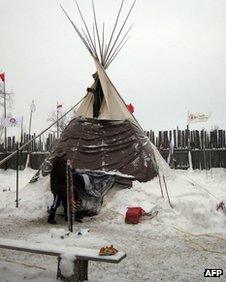Canada PM meets chiefs amid Teresa Spence hunger strike
- Published

Ms Spence has stayed inside this teepee despite freezing temperatures
Canadian Prime Minister Stephen Harper has agreed to meet a delegation of First Nation leaders, following a 25-day hunger strike by one chief.
Attawapiskat chief Teresa Spence says she will join the 11 January meeting, but continue her fast until then.
She began her protest against a budget bill critics say weakens native land rights and environmental safeguards.
Three other chiefs have joined Ms Spence in her hunger strike.
"To all the supporters and the helpers, I'm really grateful today," she said on Friday. "But I'll still be here on my hunger strike until that meeting takes place."
She did not rule out continuing the fast beyond the meeting: "We'll see what the results are, if there's really a positive result, because there are a lot of issues that we need to discuss."
Broth and tea
The Canadian government previously offered the Attawapiskat leader a meeting with Aboriginal Affairs Minister John Duncan.
On Friday, Mr Harper released a statement, external which cited his January 2012 meeting with First Nations leaders and said he would meet with chiefs "in this spirit of ongoing dialogue".
Mr Harper said the "working meeting" would focus on "the treaty relationship and aboriginal rights and economic development".
While the Attawapiskat leader has continued her fast, First Nations protesters and others have rallied around her, as well as Canadian indigenous rights movement Idle No More, in protest on a range of issues.
Ms Spence has staged her protest in a traditional teepee within sight of the parliament buildings in Ottawa, Canada's capital city.
"This is a crisis, and we cannot continue on this path of social indifference," Ms Spence said in a statement issued earlier on Friday, before Mr Harper's announcement.
Ms Spence has urged Mr Harper to "open his heart" and meet native leaders.
During her hunger strike, Ms Spence is consuming only water, fish broth and a medicinal tea, Reuters news agency reports.
"I know it's hard for people to understand what I'm doing," she told reporters on 28 December. "But it's for this pain that's been going on too long with our people."
Ms Spence has invited MPs and senators to visit her teepee. High-profile visitors have included former Canadian Prime Minister Joe Clark.
Budget legislation passed last month by Canadian lawmakers will reduce environmental safeguards for rivers and lakes and make it easier to sell reserve lands, critics say.
Aboriginal groups have also criticised what they say are unfulfilled promises by the federal and provincial governments - dating back to the early 1900s - to give them a stake in the development of natural resources, and other benefits.
Blockades
Supporters of the Idle No More movement held marches, rallies and highway blockades across Canada in 2012, as well as "flash mob" protests with traditional drumming and dancing.
On Wednesday, protesters blocked cargo transport at Quebec's Pointe-a-la-Croix, but allowed passenger trains through.
"We are aware our fight is not with the citizens of this country, but rather the Harper government," Alexander Morrison, a spokesman for the group, told CBC News, external.
Many of the group were from the nearby Listuguj Mi'gmaq First Nation.
And on Friday, the Sikniktuk Mi'kmaq Rights Coalition in New Brunswick said they were planning a cargo train blockade in the eastern part of the province until Monday. Another protest was planned along a highway in Fredericton, New Brunswick by the Kingsclear First Nation.
In Mr Harper's year-end remarks on Monday, he said the government "continued to strengthen our relationship with First Nations", but did not mention Ms Spence.
A spokesman for Mr Duncan, the aboriginal affairs minister, said the federal government had built schools and homes, enacted measures to protect women's rights, and invested in safe drinking water in native areas.
- Published2 January 2013